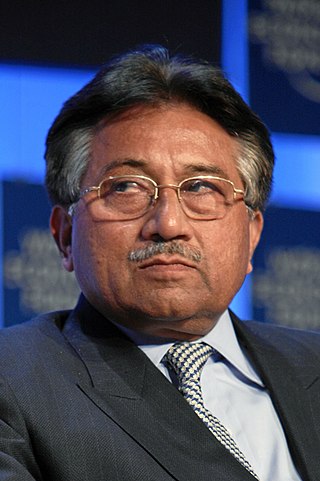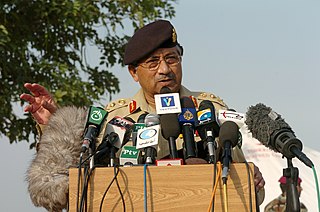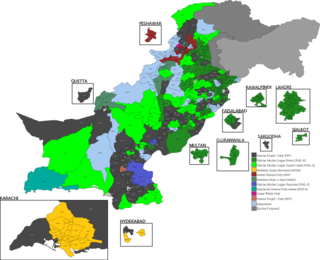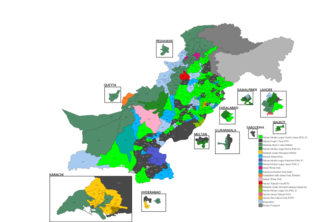
The Politics of Pakistan takes place within the framework established by the constitution. The country is a federal parliamentary republic in which provincial governments enjoy a high degree of autonomy and residuary powers. Executive power is vested with the national cabinet which is headed by Prime Minister of Pakistan, who works with the bicameral parliament and the judiciary. Stipulations set by the constitution provide a delicate check and balance of sharing powers between executive, legislative, and judicial branches of the government.

Pervez Musharraf was a Pakistani military officer and politician who served as the tenth president of Pakistan from 2001 to 2008.

The Pakistan Muslim League (N) abbreviated as PML (N), (Urdu: پاکستان مسلم لیگ (ن)) is a centre-right, conservative liberal political party in Pakistan. It is currently the third-largest party in the Senate and the largest in the National Assembly. The party was founded in 1993, when a number of prominent conservative politicians in the country joined hands after the dissolution of Islamic Democratic Alliance, under the leadership of former Prime Minister Nawaz Sharif. The party's platform is generally conservative, which involves supporting free markets, deregulation, lower taxes and private ownership. Although the party historically supported social conservatism, in recent years, the party's political ideology and platform has become more liberal on social and cultural issues; however, members have been accused of using Islamist populist rhetoric. Alongside the Pakistan Tehreek-e-Insaf (PTI) and Pakistan People's Party (PPP), it is one of the three major political parties of the country.

The Pakistan Muslim League Urdu: پاکستان مسلم لیگ (ق); Pākistān Muslim Līg (Qāf), Acronyms: PML(Q), PML-Q, PMLQ, "Q League" is a political party in Pakistan. As of the 2024 parliamentary election, it has a representation of five seats. It previously served as an ally of former prime minister Raja Pervez Ashraf's government, and led a joint election campaign in 2013 alongside Pakistan Peoples Party (PPP) in Punjab and Balochistan provinces against its rival Pakistan Muslim League (N), a fiscally conservative and centre-right force.

Chaudhry Shujaat Hussain is a senior Pakistani politician who previously served as 16th prime minister of Pakistan. Hussain is the party president of the Pakistan Muslim League (Q) since 2003.

Shaukat Aziz is a Pakistani former banker and financier who served as 17th Prime Minister of Pakistan from 28 August 2004 to 15 November 2007, as well as the finance minister of Pakistan from 6 November 1999 to 27 August 2004. He studied at St Patrick's High School, Karachi. Aziz graduated from the Institute of Business Administration in Karachi, and joined the corporate staff of the CitiBank Pakistan in 1969. He served in various countries' governments as CitiBank financier, and became executive vice-president of Citibank in 1999. After accepting a personal request by General Pervez Musharraf, Aziz returned to Pakistan from the United States to assume charge of the Finance Ministry as the finance minister while taking control of the country's economy. In 2004, Aziz was nominated by the Musharraf loyalist government, led by Pakistan Muslim League (Q), for the position of prime minister after the resignation of Zafarullah Khan Jamali on 6 June 2004.

Zubaida Jalal, is a Pakistani politician, a teacher, libertarian and social activist, who served as the Defence Production Minister from August 2018 until April 2022.

The Muttahida Majlis–e–Amal is a political alliance consisting of conservative, Islamist, religious, and right-wing parties of Pakistan. Naeem Siddiqui proposed such an alliance of all the religious parties back in the 1990s.

Since its establishment in 1947, Pakistan has had a non-symmetric federal government and is a federal parliamentary democratic republic. At the national level, the people of Pakistan elect a bicameral legislature, the Parliament of Pakistan. The parliament consists of a lower house called the National Assembly, which is elected directly via first-past-the-post voting, and an upper house called the Senate, whose members are chosen by elected provincial legislators. The head of government, the Prime Minister, is elected by the majority members of the National Assembly and the head of state, the President, is elected by the Electoral College, which consists of both houses of Parliament together with the four provincial assemblies. In addition to the national parliament and the provincial assemblies, Pakistan also has more than five thousand elected local governments.

The 1999 military takeover in Pakistan was a bloodless coup d'état initiated by the military staff at the Joint Staff HQ working under the Chairman of the Joint Chiefs of Staff Committee and Chief of Army Staff General Pervez Musharraf. The instigators seized control of the civilian government of the popularly elected Prime Minister Nawaz Sharif on 12 October 1999. On 14 October, General Musharraf, acting as the country's Chief Executive, issued a controversial provisional order that suspended the Constitution of Pakistan.

The National Reconstruction Bureau of Pakistan was an independent and constitutionally established federal institution tasked with economic recovery and prosperous development through the local government system. It was dissolved in May 2011.

General elections were held in Pakistan on 18 February 2008 to elect members of the 13th National Assembly and the four Provincial Assemblies.

Pakistan is a federal republic with three tiers of government: national, provincial and local. Local government is protected by the constitution in Articles 32 and 140-A, and each province also has its own local-government-enabling legislation and ministries responsible for implementation. District councils and metropolitan corporations are respectively the highest rural and urban tiers of local government in the provinces. Both urban and rural local government have two or three tiers in all provinces except Khyber Pakhtunkhwa, where councils are not identified as either urban or rural. There are 129 district councils across the four provinces, 619 urban councils made up of one city district, four metropolitan corporations, 13 municipal corporations, 96 municipal committees, 148 town councils, 360 urban union committees, and 1,925 rural councils. Additionally there are 3339 neighbourhood, ‘tehsil’ and village councils in Khyber Pakhtunkhwa.

A state of emergency was declared by President of Pakistan Pervez Musharraf on 3 November 2007 which lasted until 15 December 2007, during which the Constitution of Pakistan was suspended. When the state of emergency was declared, Musharraf controversially held both positions of President and Chief of Army Staff. He later resigned as army chief 25 days into the emergency on 28 November. The state of emergency and its responses are generally attributed to the controversies surrounding the re-election of Musharraf during the presidential election on 6 October 2007, including his holding of both offices of President and Chief of Army Staff at the time.

General elections were held in Pakistan on 10 October 2002 to elect the 12th National Assembly and four Provincial Assemblies. The elections were held under the military government of Pervez Musharraf. The two mainstream parties, Pakistan Peoples Party (PPP) and Pakistan Muslim League (N) (PML-N) had several restrictions imposed on them and their leaders Benazir Bhutto and Nawaz Sharif were in exile. In order to address the restrictions, PPP created the Pakistan Peoples Party Parliamentarians (PPPP) under the leadership of Ameen Faheem, to contest the elections on its behalf. The PML-N meanwhile, suffering from the party's division into two factions: one that remained loyal to Sharif and were contesting the elections under the leadership of Javed Hashmi, and the other which had broken away to form the pro-Musharraf Pakistan Muslim League (Q) (PML-Q) under the leadership of Mian Muhammad Azhar. The emergence of the PML-Q marked the beginning of multi-party politics in the country, bringing an end to the decade-long two-party system between the PPP and PML-N.
The Eighteenth Amendment of the Constitution of Pakistan was passed by the National Assembly of Pakistan on April 8, 2010, removing the power of the President of Pakistan to dissolve the Parliament unilaterally, turning Pakistan from a semi-presidential to a parliamentary republic, and renaming North-West Frontier Province to Khyber Pakhtunkhwa. It also gave self-governing, legislative and financial autonomy to provincial authorities. The package was intended to counter the sweeping powers amassed by the presidency under former presidents General Pervez Musharraf and General Muhammad Zia-ul-Haq and to ease political instability in Pakistan. The bill reversed many infringements on the Constitution of Pakistan over several decades by its military rulers. The amendment bill was passed by the Senate of Pakistan on April 15, 2010 and it became an act of parliament when President Asif Ali Zardari signed the bill on April 19, 2010. It was the first time in Pakistan's history that a president relinquished a significant part of his powers willingly and transferred them to parliament and the office of the prime minister.

Shafqat Mahmood is a retired Pakistani bureaucrat-turned-politician who served as the Federal Minister for Federal Education and Professional Training, and Federal Minister for National History and Literary Heritage, from 20 August 2018 to 3 April 2022. Before going into politics, he served as a grade 20 officer of the Pakistan Administrative Service.

Shahzada Mohiuddin was a Pakistani politician, a Federal and Provincial Minister, and Member of the National Assembly of Pakistan. He served as Minister of State for Tourism and Chairman National Assembly Standing Committee on Kashmir Affairs and Northern Areas. He was the grandson of Sir Shuja ul-Mulk. His eldest son Shahzada Iftikhar Uddin was elected as the MNA from Chitral in 2013.

Yousuf Ayub Khan is a Pakistani politician and businessmen. He is a grandson of former military Officer and president Ayub Khan..

Provincial elections were held in the Pakistani province of Punjab to elect the 14th Provincial Assembly of the Punjab on 10 October 2002, alongside nationwide general elections and three other provincial elections in Sindh, Balochistan and North-West Frontier Province. The remaining two territories of Pakistan, AJK and Gilgit-Baltistan, were ineligible to vote due to their disputed status. The elections were held under the military government of General Pervez Musharraf. The elections saw an end to the two-party system between the Pakistan Peoples Party and the Pakistan Muslim League (N), with the centre-right Pakistan Muslim League (Q) emerging as a third main party supporting Musharraf.















